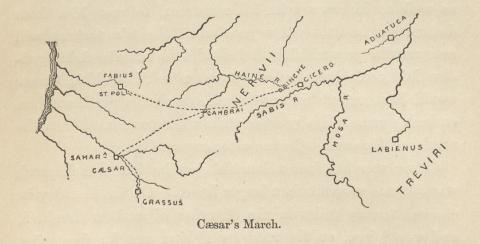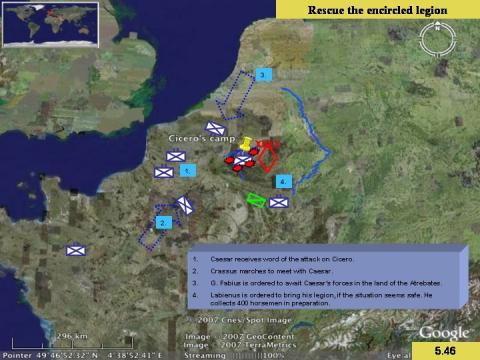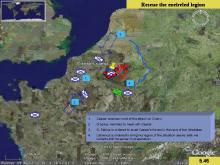Caesar marches to the rescue.
hora undecima: probably around 5 p.m., i.e., not long before dark in early winter. Since the period of daylight was divided into 12 hours, the eleventh hour was almost too late for any productive activity. (Hence our expression, 'at the eleventh hour.') (Gaisser); i.e. about five or six o'clock ( A&G 423). In this chapter and the following note the wonderful celerity of Caesar's movements and the quick obedience of his officers (Allen & Greenough).
Bellovacos: a Belgic tribe living between the Seine and the Somme rivers. One of Caesar’s legions was quartered in their territory (Gaisser).
M. Crassum: Crassus was in command of the legion quartered among the Bellovaci (Gaisser).
aberant ab eo: 'were distant from his own headquarters,' at Samarobriva (or Amiens); Crassus was at Montdidier (Moberly) ( A&G 401).
cum nuntio: cum nuntio does not mean 'along with the messenger' (that, if it were true, would be a superfluous piece of information), but 'on the arrival of the messenger' (Rice Holmes).
Alterum: 'a second' messenger (Gaisser).
C. Fabium: Fabius’ legion was quartered among the Morini. Caesar wanted him to move his legion south to the territory of the Atrebates, so that he and Caesar could join forces (Gaisser).
in Atrebatuum fines: he was to march from the neighbourhood of Boulogne by way of Tournay and Bavai to the Sambre, where Cicero was. (Moberly)
iter faciendum (esse): accusative and infinitive with sciebat (Gaisser) ( A&G 459)
sciebat: Caesar is the subject. (Hodges)
Labiēnō: Labienus’ legion was quartered to the south among the Remi (Gaisser).
rei publicae commodo: 'with advantage of the state'; i.e., without detriment to Rome’s interests (Gaisser) ( A&G 376).
paulo…longius: 'a little too far away,' 'a little more distant.' paulo is ablative of degree of difference (Gaisser) ( A&G 414).



